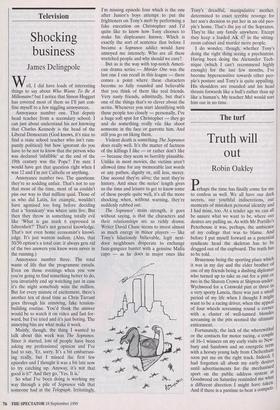Television
Shocking business
James Delingpole
Well, I did have loads of interesting things to say about Who Wants To Be A Millionaire? but I notice that Simon Hoggart has covered most of them so I'll just con- fine myself to a few niggling annoyances.
Annoyance number one. That deputy head teacher from a secondary school: I can just about understand his not knowing that Charles Kennedy is the head of the Liberal Democrats (God knows, it's nice to find a state school teacher who isn't ram- pantly political) but how ignorant do you have to be not to know that the person who was declared 'infallible' at the end of the 19th century was the Pope? I'm sure I would have got that question right when I was 12 and I'm not Catholic or anything.
Annoyance number two. The questions: they're so sodding unfair. That's not to say that most of the time, most of us couldn't piss our way to that million quid. Those of us who did Latin, for example, wouldn't have agonised too long before deciding that a 'formicary' was where ants live. But then they throw in something totally evil like 'What is gas mark 6 expressed in fahrenheit?' That's not general knowledge. That's not even home economist's knowl- edge. It's just wanton sadism. (Also, that 50/50 option's a total con: it always gets rid of the two answers you knew were never in the running.) Annoyance number three. The total waste of life that the programme entails. Even on those evenings when you vow you're going to find something better to do, you invariably end up watching just in case it's the night somebody wins the million. But for every minute of excitement, there's another ten of dead time as Chris Tarrant goes through his annoying, fake tension- building routine. You'd think the answer would be to watch it on video and fast for- ward, but I've tried and it's just boring. The annoying bits are what make it work.
Mainly, though, the thing I wanted to talk about this week was The Sopranos. Since it started, lots of people have been asking my professional opinion and I've had to say, 'Er, sorry. It's a bit embarrass- ing really, but I missed the first few episodes and I thought it was a bit late now to try catching up. Anyway, it's not that good is it?' And they go, 'Yes. It is.'
So what I've been doing is working my way through a pile of Sopranos yids that someone had at the Telegraph. Irritatingly, I'm missing episode four which is the one after Junior's boys attempt to put the frighteners on Tony's mob by performing a fake execution on Christopher and I'd quite like to know how Tony chooses to make his displeasure known. Which is exactly the sort of sentence that before I became a Sopranos addict would have annoyed me intensely. Who are all these wretched people and why should we care?
But as is the way with top-notch Ameri- can drama series — Murder One was the last one I can recall in this league — there comes a point where these characters become so fully rounded and believable that you think of them like real friends. Very nasty friends, admittedly, but that's one of the things that's so clever about the series. Whenever you start identifying with these people too closely — personally, I've a huge soft spot for Christopher — they go and do something really vile like shoot someone in the face or garrotte him. And still you go on liking them.
Violent death is something The Sopranos does really well. It's the matter of factness of the killings I like — or rather don't like — because they seem so horribly plausible. Unlike in most movies, the victims aren't allowed time for any memorable last words or any pathos, dignity or, still less, mercy. One second they're alive; the next they're history. And since the series' length gives us the time and leisure to get to know some of these people quite well, it's all the more shocking when, without warning, they're suddenly rubbed out.
The Sopranos' main strength, it goes without saying, is that the characters and their relationships are so richly drawn. Writer David Chase seems to invest almost as much energy in minor players — like Tony's hilariously believable, legit next- door neighbours desperate to exchange faux-gangster banter with a genuine Mafia capo — as he does in major ones like Tony's dreadful, manipulative mother, determined to exact terrible revenge for her son's decision to put her in an old peo- ple's home. That's the joy of the Sopranos. They're like any family anywhere. Except they keep a loaded AK 47 in the sitting- room cabinet and murder more people.
I do wonder, though, whether Tony's doing the right thing seeing a psychiatrist. Having been doing the Alexander Tech- nique (which I can't recommend highly enough) for the last few months, I've become hypersensitive towards other peo- ple's posture and Tony's is quite appalling. His shoulders are rounded and his head thrusts forwards like a bull's rather than up like a human's. My teacher Mel would sort him out in no time.


























































































 Previous page
Previous page